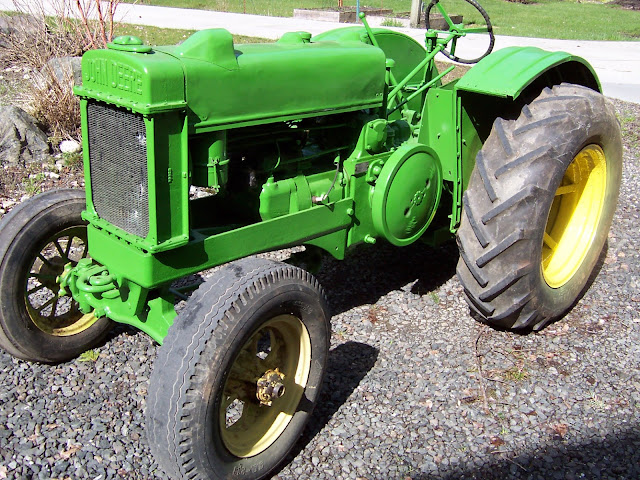By now I should know not to go to tractor shows. They're dangerous. Yes, I bought yet another tractor today (7/12/2024). But it was a good deal. The gentleman I bought the tractor from was a co-worker of mine from way back in the 80s and 90s. I'd bought a 1950 John Deere BN with a front loader from him around 1994. That tractor is long gone but in the last few years I'd reconnected with the gent through a local tractor club I'd joined several years ago. Recently he had been making comments occasionally that he wanted to sell this tractor and I took note.
Well, today was a tractor show and I noticed he had the tractor at the show when I got there. It had died shortly after he got it off the trailer at the show and it didn't want to start again (a couple experts were trying to get it going). I jokingly asked what the broken-down tractor was going for today. He said, "$2,500 show special." Later he threw out some other numbers. Sometime in the afternoon I told him I'd like to buy his tractor, and he seemed surprised that I was actually interested. So the deal was made (for less than the "show special" price). I came back home and picked up my trailer, then drove back to get the tractor. I put 180 miles on my truck in the four trips down and back from the show. Here's the first photo. Isn't it cute?
After I paid the gent for the tractor, I said I could try to start the tractor if he tells me how to set things like choke and throttle, as he couldn't leave his registration table duties at the time. He told me a couple of specifics (set the choke to 3/4 closed and set the throttle to full). I opened the gas petcock, made sure the transmission was in neutral, then rolled the flywheel through one compression stroke and it lit off immediately. Cool. I drove the tractor back 5 feet to clear an obstacle, then started forward, at which time the engine died. Hmm. After 10 minutes of fiddling with carburetor jets, sediment bowl, carb bowl, and whatnot, I got the engine running well, so I was able to drive the tractor onto the trailer. I'd brought a Come-Along just in case the tractor wouldn't run, but I may have died of heat exhaustion in the 86 degree humid heat if I had to use it.
This tractor has a two-speed transmission with a high/low auxiliary, giving it four forward gears and a not-whopping 6.8 mph top speed, although my GPS registered 8.8 mph, so does mine have the optional road gear? I don't know. The engine is a 149 cubic inch two-cylinder "all-fuel" model (thus the two fuel caps and tanks - small tank with red cap for gas for starting, green cap/large tank for distillate/kerosene, but most folks these days run them on gasoline only). It is started by hand using the large flywheel on the left side of the tractor, a unique characteristic mainly found on early John Deere tractors. Another uncommon feature of these old JD tractors is they had a hand clutch instead of the much more common foot clutch.
This next photo below shows the funky BO exhaust and the magneto ignition (no battery needed). The engine has a fan for cooling but there is no water pump. The cooling is done by what they call "thermo-siphon", where the hot water from the engine block rises and travels to the top of the radiator, drawing in cooler water from the bottom of the radiator into the engine block.
Loaded up and truckin', as Jerry Reed used to sing... (East Bound and Down song)
Here it is at its new home.
I found this serial number breakdown for BR and BO tractors (see below). The BR and BO were "regular" or standard-tread tractors, unlike the normal row-crop tractors everyone is familiar with. The BR and BO were identical except for some small differences like intake/exhaust coming out the hood on the BR and differential turning brakes on the BO (the brakes eventually ended up as an option on the BR).
This next photo below shows the 1937 BO I bought in 1998 and sold in 2011. It wasn't nearly as nice as my "new" 1936 BO. Here's a bit of a coincidence, but I have to put names to people. A guy by the name of Nick owned both the 1936 and 1937 BO tractors at one time. I bought the '37 from Nick in '98 and the guy I bought the '36 from, Frank, bought the '36 from Nick (I don't know when, but more recent than '98).
And lastly, below is the 1944 model B I bought in 1994 and sold in 1998 (different than the 1950 BN with the front end loader I'd bought from tractor club guy Frank - I don't have any photos of that one). This model B tractor below is substantially larger than the BO (although essentially the same engine and transmission), and was made for farming crops, so they were conveniently called "row-crop" tractors.









No comments:
Post a Comment